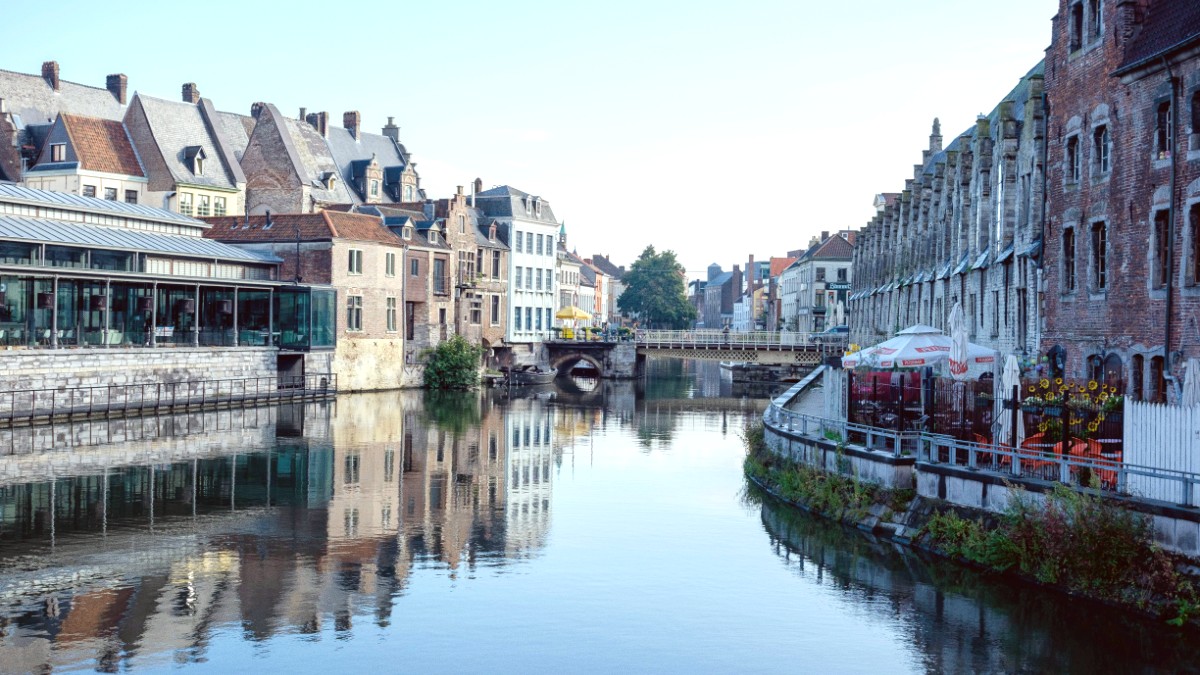
Flanders, Belgium
The timing of your visit to Ghent shapes your experience. Ghent experiences a temperate maritime climate, with mild temperatures and rainfall throughout the year.
Ghent has no monsoons or hurricanes. Extreme temperatures, either significantly below -5°C (23°F) or above 30°C (86°F), occur less often but can happen. Always check the weather forecast closer to your travel date for the most accurate information. Prepare for rain regardless of the season.
High Season (June-August, and December for Christmas markets): Warmest weather, longest daylight. Many outdoor events and festivals. City has a lively, festive atmosphere. Expect higher prices for accommodation and flights. Major attractions have larger crowds.
Shoulder Season (April-May, September-October): Pleasant temperatures for sightseeing, fewer crowds than summer. Prices for accommodation and flights are more moderate. Spring brings beautiful blooms, autumn has striking foliage. Weather can be unpredictable, cooler evenings, more rain.
Low Season (November-March, excluding December peak): Lowest prices for hotels and flights. Attractions have fewest crowds. City takes on a cozy atmosphere, December has charming Christmas markets. Coldest, dampest weather. Short daylight hours.
Expect crowds & higher costs
Warm weather, long daylight, many festivals.
Higher prices, larger crowds.
Good weather, fewer crowds
Pleasant temperatures, moderate prices.
Unpredictable weather, cooler evenings.
Lower costs & fewer people
Lowest prices, fewest crowds.
Coldest, dampest weather, short daylight.
Belgium is a member of the Schengen Area. Citizens of many countries, including the USA, Canada, Australia, UK, New Zealand, and all EU member states, do not need a visa for stays up to 90 days within any 180-day period. This applies to tourism or business purposes. If your nationality needs a Schengen visa, you submit your application to the embassy or consulate of Belgium in your home country. This process generally takes 15 calendar days, but can go up to 45 days during peak travel seasons. Apply well in advance of your planned departure date.
A change is coming with the introduction of ETIAS (European Travel Information and Authorisation System). Starting mid-2025, non-EU citizens who currently travel visa-free to the Schengen Area will need an ETIAS authorization. This is an electronic travel authorization, not a visa. You apply online, and the process is usually quick. It costs €7 and remains valid for three years or until your passport expires, whichever comes first. This system supports security within the Schengen Area.
Valid for at least three months beyond departure, issued within 10 years.
Proof of adequate financial means (bank statements, credit limits).
Hotel bookings or invitation letter from a host.
Return or onward ticket out of the Schengen Area.
Travel insurance with minimum €30,000 medical coverage.
Ghent has experiences for various budgets, from frugal backpackers to luxury seekers. The official currency in Belgium is the Euro (€, EUR).
ATMs are widely available in Ghent for cash withdrawals. Most hotels, restaurants, and shops accept major credit and debit cards (Visa, Mastercard). Inform your bank of your travel plans to prevent card issues. Currency exchange offices often provide less favorable rates than ATM withdrawals. Cards are typically fine for larger transactions, but carry some cash for smaller purchases or street food.
These strategies for Ghent can stretch your budget.
These estimates are a general guide for daily expenses in Ghent. Individual spending patterns cause variations.
| Travel Style | Accommodation | Total Daily Cost |
|---|---|---|
| Budget Traveler | €40-€70 | €77-€140 |
| Mid-range Traveler | €80-€150 | €145-€280 |
| Luxury Traveler | €180-€400+ | €320-€700+ |
Ghent has a safe reputation, but practical information for emergencies and common concerns is always wise.
No specific vaccinations are required for entry beyond routine immunizations (MMR, DTP, Polio, Flu).
Low risk in Belgium due to high hygiene standards. Practice good hand hygiene.
Pollen counts can be high in spring/summer. Colds are common in winter. Bring medication if you have allergies.
Practice good personal hygiene.
Maintain good personal hygiene, including frequent hand washing. Tap water in Ghent is safe to drink. Belgium maintains high food safety standards. Restaurants and street food vendors follow strict hygiene. Eating out is generally safe.
Consider packing a basic travel first aid kit for minor ailments like headaches, cuts, or blisters. This aids in immediate personal care. Always consult a healthcare professional for personalized advice based on your medical history and travel plans.
No special health screenings are done at the border.
Belgium has a high standard of healthcare. Hospitals and pharmacies are available and give quality care.
Dial 112 for ambulance, fire, or police. This number works across all EU countries. For non-emergencies, call 101.
Identified by a green cross sign. An on-call pharmacy service is for emergencies outside regular hours.
Ghent has a very safe reputation, with low rates of violent crime. There are very low natural disaster risks; occasional strong winds or heavy rain can occur.
Keep a list of these numbers, and your insurance company's emergency line, on your phone and a physical copy.
Dial 112 (ambulance, fire, police).
Contact your bank immediately using their international emergency number.
Report to local police, then contact your country's embassy or consulate in Brussels.